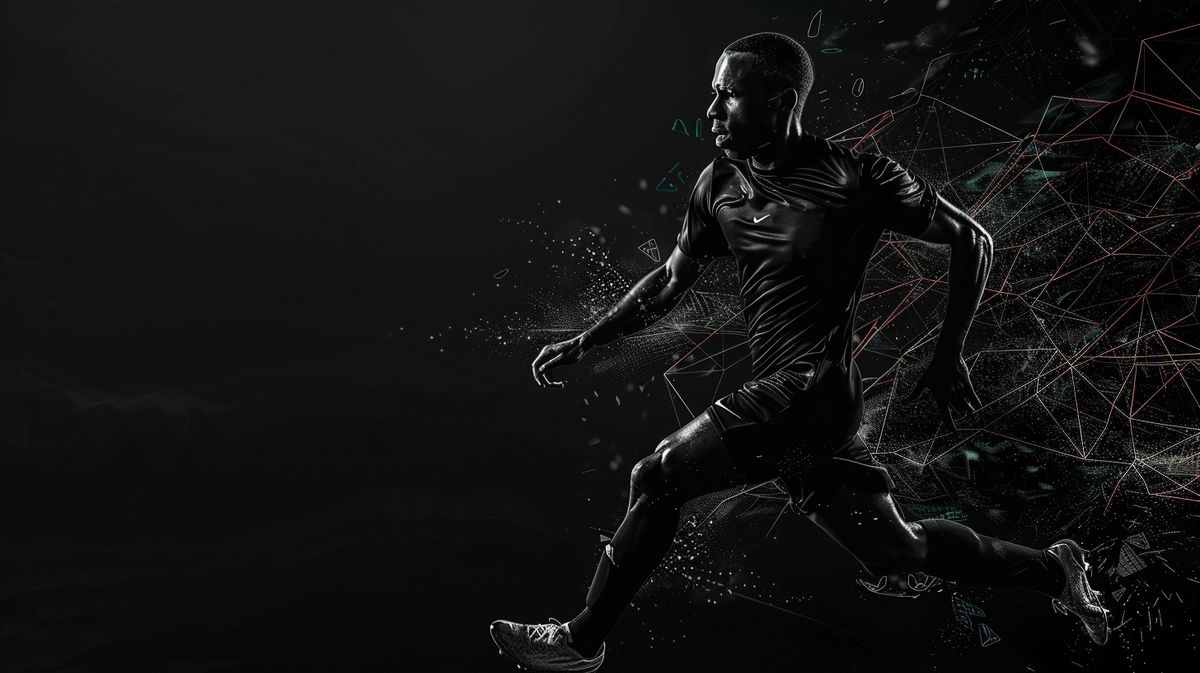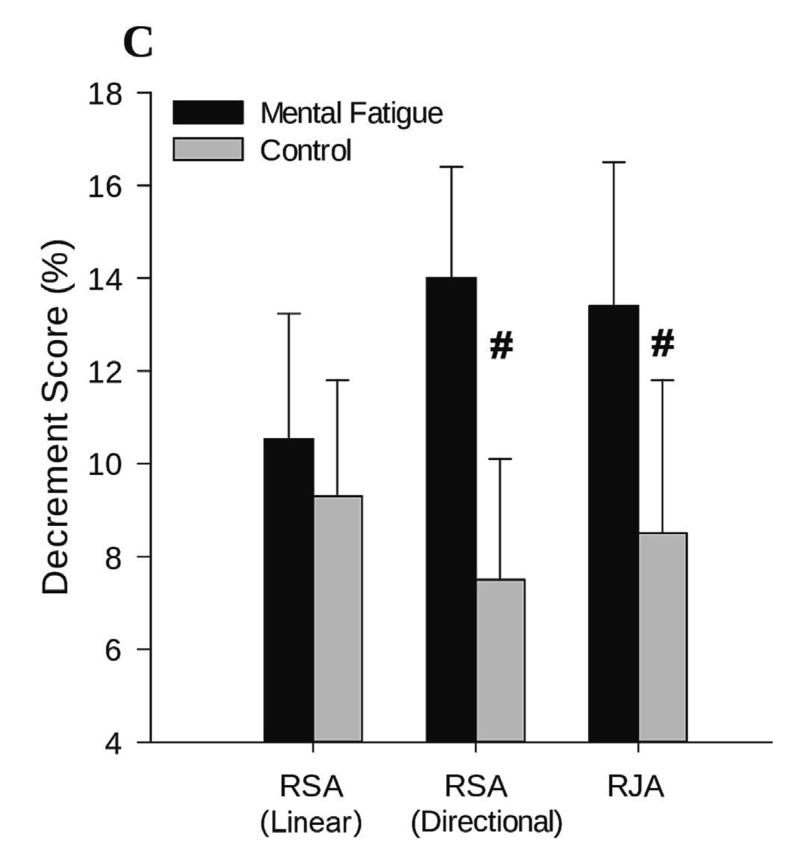How To Increase Your Athletes Repeated Sprint Performance With Brain Endurance Training (BET)
Repeated Sprint Ability improved by +10% in the BET group, compared to a +3% improvement in the control group, highlighting BET's effectiveness in enhancing sprint performance.

When it comes to physical performance, most teams, clubs, and coaches have established methods for what works and what does not, including how to periodize and implement methods such as increasing repeated sprint speed, which is crucial in many team sports. However, one vital piece of the puzzle that can impair repeated sprint performance is mental fatigue. A recent publication found that mental fatigue led to a noticeable decrease in sprinting capability.
Athletes' perceived exertion rate (RPE) increased by 7-12% when mentally fatigued, making every sprint feel significantly harder. There was also a 9% reduction in sprinting speed, a critical factor in the outcomes of many sports.

The researchers recommended that coaches and practitioners could use brain endurance training (BET), a form of fatigue-inoculation training, as a long-term solution to increase resilience against mental fatigue.
Another study that utilized Brain Endurance Training (BET) found that by progressively exposing athletes' brains to increasing levels of cognitive demands, thereby inducing mental fatigue, it was possible to stimulate psycho-physiological changes. These changes enhance the brain's endurance and, consequently, increase physical performance. After 4 weeks of Brain Endurance Training (BET), post-test analysis showed that the BET group improved their performance more than the control group in directional sprints but not in linear sprints. Notably, the Repeated Sprint Ability improved by +10% in the BET group, compared to a +3% improvement in the control group, highlighting BET's effectiveness in enhancing sprint performance. While performance in the linear acceleration phase of the RSA test primarily depends on anaerobic metabolism and neuromuscular function, performance in directional sprints also relies on the player's ability to quickly respond to visual stimuli and decide the correct movement direction.

While performance in the linear acceleration phase of the RSA test primarily depends on anaerobic metabolism and neuromuscular function, performance in directional sprints also relies on the player's ability to quickly respond to visual stimuli and decide the correct movement direction. The findings suggest that BET improved the cognitive component of this multitasking performance test, assessing physical and cognitive skills relevant to football. It's noteworthy that they required players to complete twice as many sprints (12 instead of 6) as the standard RSA test. Given evidence that mental fatigue is associated with poorer physical and technical performance in football, as well as decreased decision-making skill and visual search performance in basketball, it is possible that the post-BET group experienced less effort during the physical task. This allowed them to have sufficient residual cognitive resources to focus better on the task, respond faster to visual stimuli, and decide quicker on movement direction during the task.
In conclusion, the emerging body of research surrounding Brain Endurance Training (BET) provides compelling evidence of its efficacy in enhancing athletic performance. By creating psycho-physiological changes and enhancing the brain's endurance, BET consequently increases physical performance. This groundbreaking approach to training complements traditional physical training methods. The significant improvements observed in repeated sprint performance, as discussed in this article, underscore the potential of BET to revolutionize how athletes prepare for competition. Coaches, practitioners, and athletes are encouraged to consider BET not just as an alternative, but as an integral component of a comprehensive training strategy that addresses both the physical and cognitive demands of sports. This dual approach could be the key to unlocking untapped potential, ensuring athletes are not only physically prepared but also mentally resilient, ready to outperform their competition.
🌐 Connect With Us
🌍 Soma Technologies: Engineered to enhance human performance.
📸 Instagram: Dive into our world through exclusive photos and stories.
👥 Facebook: Join our community for the latest updates and discussions.
📈 LinkedIn: Connect with us professionally and stay informed about industry news.
🎥 YouTube: Watch our latest videos, tutorials.
🐦 X: Follow us for instant updates, news, and engaging tweets.
Research
Concurrent Brain Endurance Training Enhances Endurance Exercise Performance
Endurance performance across three tasks showed a greater improvement following Brain Endurance Training (BET) with a 32% increase, compared to a 12% increase in the control group (p < 0.05). The enhanced performance with BET was accompanied by a higher pre-frontal oxygenation during post-training tasks over time relative to the control (p < 0.05).
Performance Improvements:
- Brain Endurance Training (BET): +32%
- Control Group: +12%
ScienceDirect Study on Endurance Performance
A Randomized Controlled Trial of Brain Endurance Training to Reduce Endurance Exercise Fatigue
BET, combined with traditional physical training, is shown to be highly effective in improving endurance performance in healthy active males. BET offers a novel training stimulus for elite endurance athletes, potentially increasing their training load without the risk of musculoskeletal injuries and serving as a viable training method for injured athletes who are unable to perform physical training.
Performance Improvements:
- Brain Endurance Training (BET): +126%
- Control Group: +42%
ResearchGate Study on Reducing Fatigue
Brain Endurance Training Improves Physical, Cognitive, and Multitasking Performance in Professional Football Players
Post-training assessments revealed that the BET group consistently outperformed the control group in physical, cognitive, and multitasking performance, marking significant improvements in agility, sprint ability, and cognitive response times.
Performance Improvements:
- Repeated Sprint Ability: BET +10% vs. Control +3%
- Agility: BET +8.9% vs. Control +4.3%
- Attention: BET +42% vs. Control No Change
- Error Rate: BET - 69% vs. Control - 21%
- Cognitive Performance: BET +11% vs. Control +4%
Human Kinetics Journals Study on Football Players' Performance
Prior Brain Endurance Training Boosts Endurance Exercise Performance
Implementing BET prior to physical training sessions resulted in a 24% improvement in endurance performance, surpassing the 12% improvement from physical training alone. This advantage was linked to improved prefrontal oxygenation.
Performance Improvements:
- Brain Endurance Training (BET): +24%
- Control Group: +12%
Taylor & Francis Online Study on Endurance Performance
Brain Endurance Training Enhances Endurance and Cognitive Performance in Road Cyclists
Brain Endurance Training (BET) has been shown to significantly enhance endurance and cognitive response in road cyclists, while not notably changing physiological metrics.
Performance Improvements:
Time to Exhaustion Test at 80% Peak Power Output (PPO):
- BET: +11.4%
- Control: +3.4%
Time to Exhaustion Test at 65% PPO:
- BET: +17.1%
- Control: +2.8%
20-minute Time Trial:
- BET: +550 meters
- Control: +135 meters
5-minute Time Trial:
- BET: +60 meters
- Control: +24 meters
ScienceDirect Study on Cyclists' Performance
Combination of Brain and Physical Endurance Training Elevates Exercise Tolerance
The combination of brain endurance and physical training not only boosted maximal oxygen consumption but also significantly lowered perceived exertion during endurance tests.
Performance Improvements:
- Brain Endurance Training (BET): +176%
- Control Group: +86%
Journal of Practical Studies of Biosciences in Sport Study on Exercise Tolerance
Enhanced Endurance in Soldiers Through Brain and Body Training
Incorporating BET into aerobic training resulted in improved physical performance outcomes and induced functional alterations in brain regions associated with the perception of demand, effort, and fatigue.
Army.mil Article on Soldiers' Endurance
Improved Shot Speed and Accuracy in Padel Players Through Brain Endurance Training
Brain Endurance Training (BET) significantly improved skill-based psychomotor performance in padel players under conditions of fatigue, suggesting an increase in mental fatigue resilience.
Performance Improvements:
Volley Shot (VS):
- BET: +24%
- Control: +17%
Drive Shot (DS):
- BET: +16%
- Control: +12%
Afterglass Shot (AGS):
- BET: +21%
- Control: +15%
Bandeja Shot (BS):
- BET: +20%
- Control: +14%
